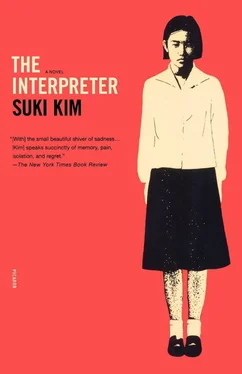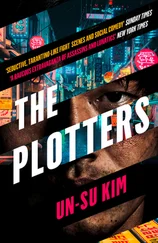Suki Kim - The Interpreter
Здесь есть возможность читать онлайн «Suki Kim - The Interpreter» весь текст электронной книги совершенно бесплатно (целиком полную версию без сокращений). В некоторых случаях можно слушать аудио, скачать через торрент в формате fb2 и присутствует краткое содержание. Город: New York, Год выпуска: 2011, ISBN: 2011, Издательство: Picador, Жанр: Детектив, Триллер, на английском языке. Описание произведения, (предисловие) а так же отзывы посетителей доступны на портале библиотеки ЛибКат.
- Название:The Interpreter
- Автор:
- Издательство:Picador
- Жанр:
- Год:2011
- Город:New York
- ISBN:0-312-42224-5
- Рейтинг книги:3 / 5. Голосов: 1
-
Избранное:Добавить в избранное
- Отзывы:
-
Ваша оценка:
- 60
- 1
- 2
- 3
- 4
- 5
The Interpreter: краткое содержание, описание и аннотация
Предлагаем к чтению аннотацию, описание, краткое содержание или предисловие (зависит от того, что написал сам автор книги «The Interpreter»). Если вы не нашли необходимую информацию о книге — напишите в комментариях, мы постараемся отыскать её.
The Interpreter — читать онлайн бесплатно полную книгу (весь текст) целиком
Ниже представлен текст книги, разбитый по страницам. Система сохранения места последней прочитанной страницы, позволяет с удобством читать онлайн бесплатно книгу «The Interpreter», без необходимости каждый раз заново искать на чём Вы остановились. Поставьте закладку, и сможете в любой момент перейти на страницу, на которой закончили чтение.
Интервал:
Закладка:
It takes all her concentration not to get sick on the bus. The constant lurchings, the reek of gasoline, the jammed traffic in the Lincoln Tunnel—none of it helps. It does not seem to matter that the bus is moving in the opposite direction from the Manhattan-bound traffic. The tunnel keeps spinning. Suzy holds her breath, thinking that it might keep her stomach from rising up again. Two bottles of wine, not so smart to get on an interstate bus the first thing in the morning. A man on the other side of the aisle keeps fumbling with the paper bag in his lap. He takes something out and begins nibbling it, exuding a distinctly crunchy noise. Hash browns, wrapped in the McDonald’s cover. Soon he takes another out. Suzy wonders how many are in there. How many hash browns can a person eat at once? The sudden pungent smell of its microwaved, fried grease rushes up her nose, and Suzy swallows hard, pressing her forehead on the cold windowpane to push the nausea away.
The hard surface against her skin seems to help a little, but then a gigantic billboard emerges on which lies a striking blonde in a neon-green bikini that looks electric against her implausibly copper tan. WELCOME TO NEW JERSEY, it says across the top of the blonde. It is impossible to tell what the advertisement is for exactly, but the bus swerves past before Suzy can study more closely. Suddenly it is not clear if the chill in the air signals the winter’s coming or leaving. Could the summer be just around the corner?
She hasn’t had enough water. She wonders if Hash Brown Man has some spare water in his paper bag. She wonders if he will share it, although she can’t decide if she wants water that has been stuck in there with all of his other fried snacks. She is thirsty, shivering. The summer is definitely nowhere near, she thinks, huddled in her coat with her face pressed back against the window.
It is impossible for her to raise her head. When the driver tells her that this is Fort Lee High School, this is where she should get off, Suzy inhales once before running out, holding her face in her hands. Then she is not exactly clear how she pushes through the main entrance, bypasses the security, makes it up the stairs, finds her way down the corridor, and finally, bending over a toilet bowl in the first-floor ladies’ room, heaves up the contents of her stomach, her hair stuck on her wet face.
Her mouth tastes sour—that is the first thing she remembers thinking. After flushing the toilet, she staggers out of the stall, turns on the tap, and dunks her face in the cold water. Something gives inside her, a horrible knot, a twisted froth. She swallows the water, and it is surprisingly refreshing, this tap water in the ladies’ room at Fort Lee High School. Then Suzy lifts her face with water dripping from her wet hair, only to see that she is surrounded by a roomful of young faces peering at her.
“You okay?” One of the girls steps forward, offering her a piece of brown paper towel from the dispenser.
“Yes, fine now, I’m fine. Thank you.” Suzy wipes her face, and feels suddenly wide awake. The first period must not have begun yet. Around her are a group of girls, now scattering back to their corners to wait in line for a stall, to stand before mirrors, holding aluminum cans of spray to their highlighted hair or applying another layer of lipstick, mascara, eyeliner on such youthful faces. A commotion. Teenage girls all getting ready at once. Suzy had been like that, long ago, so impossibly long ago. And Grace. Of course Grace. What would Grace say if she knew, if she saw her right now? The thought alarms Suzy, and she quickly rinses her mouth again and smooths her hair. It is better now. The sick feeling has passed. And most of all, she is finally here, at the Fort Lee High School, where her sister must be standing before a class, before a roomful of boys and girls who are now rushing out at the loud thud of a bell.
“Wait, please!” Suzy calls after the one who offered her the towel. The girl turns around, the glitter on her eyelids twinkling under the fluorescent gleam. “Do you know where I can find Miss Grace Park? She teaches ESL.”
The girl turns to the group around her as if to say, Do you know? No one seems to know; their faces are blank. Of course, ESL, only for the kids whose English is not fluent. Then a tiny voice pops out of nowhere and volunteers in Korean, “I do.”
Suzy turns around to find a small, round girl to her right, who seems to have been standing there all along. She is curiously short, barely over four feet tall. She is alone, unlike the other girls, who all seem to be traveling in groups.
“Are you one of her students?” Suzy stoops a little to face her. “No, not anymore,” the girl answers, lowering her gaze as though she is not used to making eye contact with an adult. Her jeans are belted too high, definitely no hip-huggers. No piercing in her ears. No makeup whatsoever. A true FOB. There were girls like this even back in Suzy’s school days. They spoke very little English and only hung out with each other. They carried Hello Kitty bags and kept photos of Korean pop stars in their wallets. They looked frightened when white boys spoke to them and avoided girls like Suzy and Grace, whom they secretly called Twinkie.
“But you know where she might be?”
The girl nods, still without looking up. She seems suspicious of Suzy. Why wouldn’t she be? Here’s an adult who spent the better part of the morning throwing up in the school toilet. In the world of teenagers, just being an adult is reason enough for suspicion. To appease her, Suzy asks softly, “So is Miss Park a good teacher? Do students like her?” She is not sure why she wants to know, but she does. Grace’s life. This bashful teenager in front of her. This first-floor ladies’ room. This concrete building filled with ebullient sixteen-year-olds. This suburban town half an hour away from Port Authority.
“Yes,” the girl answers with surprising eagerness. Then, as if suddenly aware of her own voice, she drops her gaze and mumbles, “They said I’m ready to quit ESL, but Ms. Park lets me sit in her class sometimes. She says it’ll get rid of my headache.”
“A headache?”
“Ms. Park says that so much English all day is what’s giving me a headache.”
A strange thing for an ESL teacher to say. Suzy has never quite thought of it that way—the English language being a headache-inducer. She wonders if such a reaction might also happen at depositions. She wonders if her translation sometimes sends the witness home with a migraine. Then she realizes that her own headache has faded. She probably threw up all the alcohol. Her stomach must be spotlessly clean, emptied.
“Can you show me to her class?”
The girl nods again, leading the way. The classroom is on the third floor. The stairs are steep and wide, the way they often are in old buildings. The students obviously get enough exercise, walking up and down between classes. The second bell must not have rung yet. Kids are rushing from lockers to classes, some grumpy and morose, some clapping high fives with dramatic facial expressions. Those are the popular kids, Suzy can tell. The ones who are not afraid to be seen, the ones used to being seen.
Neither Suzy nor Grace had known such teenage years. Theirs was the darkness surrounding home, the brooding silence before a storm. Suzy is not sure if her parents had always been so uninterested in each other, or if they just ran out of things to say over the years. It did not help that they were always tired. By the time they came home, around nine or ten, they had been working for over twelve hours. By rule, Suzy and Grace would have to sit at the table while they ate, although almost always both girls had already eaten. Often Dad burst into a rage, the violent, vicious thrashing of words. He would lash out at whoever happened to be near. Sometimes he would grumble about the kimchi being too sour, the rice not cooked enough, the anchovies too salty. He would take a bite and make a face, and then storm out of the kitchen, slamming the door behind him. Sometimes he would scream at both Suzy and Grace for sitting there like idiots while he slaved all day to put food on the table. Mom would never say anything back. She would sit there and finish her rice to the bottom of the bowl, and then get up to clear the dishes. She would never ask Suzy or Grace for help. She would never apologize for Dad’s moods. She would pretend that nothing had happened. Then, finally, she would turn to both and say, “Go finish your homework and get to bed, it’s a school night.” Suzy can still hear Mom. It’s a school night . She would say it sometimes even on weekends. Both her parents often worked seven days a week. They rarely had weekends.
Читать дальшеИнтервал:
Закладка:
Похожие книги на «The Interpreter»
Представляем Вашему вниманию похожие книги на «The Interpreter» списком для выбора. Мы отобрали схожую по названию и смыслу литературу в надежде предоставить читателям больше вариантов отыскать новые, интересные, ещё непрочитанные произведения.
Обсуждение, отзывы о книге «The Interpreter» и просто собственные мнения читателей. Оставьте ваши комментарии, напишите, что Вы думаете о произведении, его смысле или главных героях. Укажите что конкретно понравилось, а что нет, и почему Вы так считаете.












